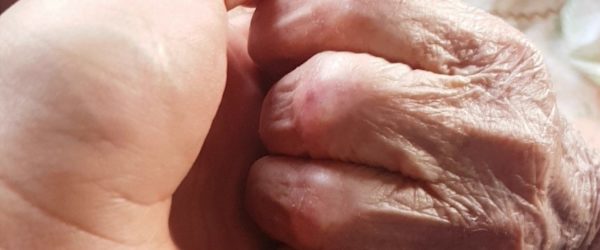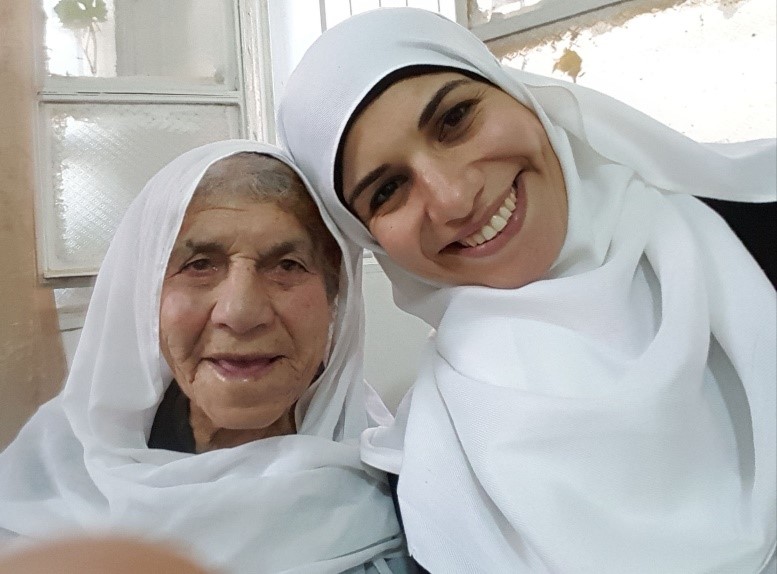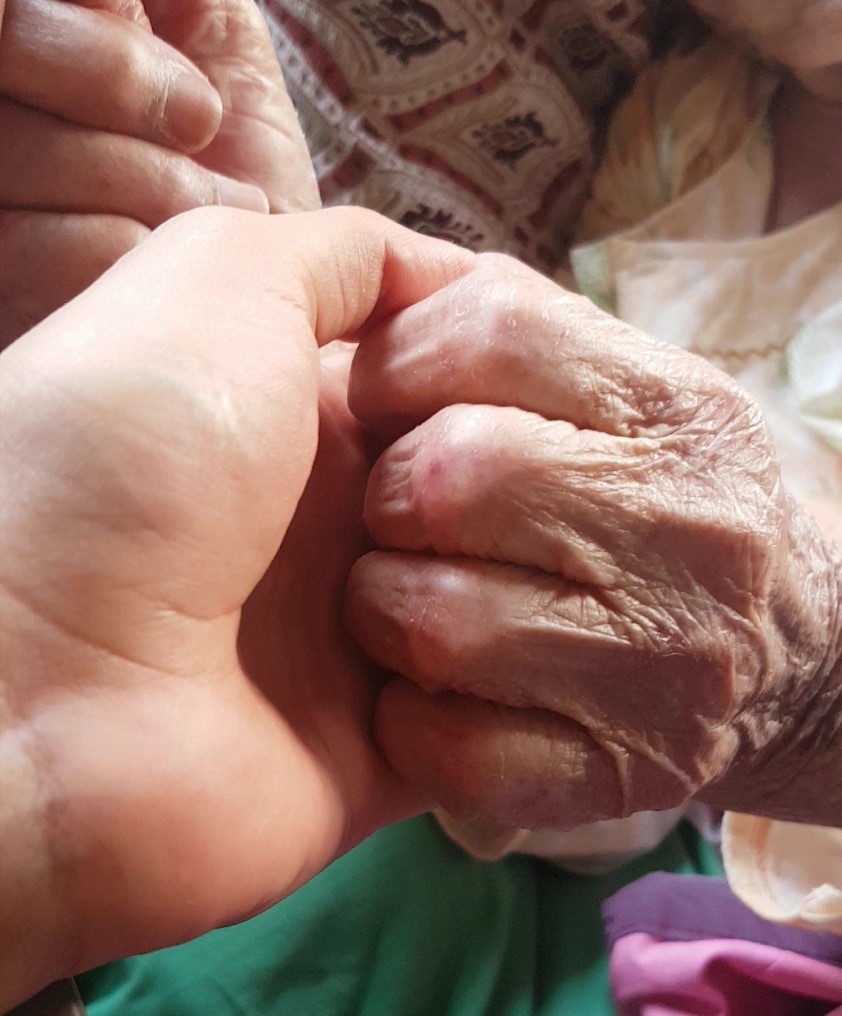I’ll never forget March 21st of last year. It was Mother’s Day here in Amman and across the Middle East. I spent my mornings driving from school to school attending my children’s performances. Once I was done, I planned to take a cake to my grandparents house and celebrate with my grandmother since my mother was in America. But while I made my way home, I got a phone call from my aunt. She said my grandmother, Siti, wasn’t feeling well and had been admitted into the hospital.
My aunt’s voice was panicked. She was telling me to hurry, that it looked like my grandmother was going to be admitted to the ICU and wasn’t looking good. Siti wasn’t conscious. I raced through the streets trying to get to her as fast as I could. But it’s a 30-minute drive, with traffic much more sometimes. I just kept making dua, “Please Allah let me see her again. Please do not let her die before I get a chance to say goodbye.” I was so distraught, I am sad to report I hit a rooster that ran out into the road. I just kept thinking maybe that rooster gave its life for Siti. I don’t know, like I said, I was distraught.
My aunt kept calling, “Where are you? She’s fading!” I sped up and kept making dua. Please, please, please.
I don’t really remember the first time I met Siti. I know she visited America when I was 8 because I’ve heard the stories and seen pictures. But I don’t really remember spending time with her. The next time I would see her was when I was 17 and we came to Amman for the summer for a visit. It was like meeting someone for the first time and, yet, knowing them simultaneously. I could see my father in her so clearly, and I just transferred all that love on to her. And she to me. She was always smiling and hugging me. I couldn’t really understand her when she spoke to me in Arabic, but those hugs needed no language.
I never would have thought I’d live in the Middle East. Never. I’d been to Palestine and to Jordan, but I didn’t really feel any real affinity to either place. The fact that I spoke zero Arabic (Marhaba, keefik, Alahmdulilah was the extent of my vocabulary) lent itself to the biggest reason why. But by the time I was 22, I was married and on a plane to Amman with my husband and an infant son in tow embarking on a new adventure. I was nervous and scared, but I got to reconnect with Siti and she helped me feel better. Siti like most of her generation sent their kids to America hoping for better lives but always wanted them to return… To resettle back in their homes. She was so happy and confident that this was the best decision of our lives.
Since then, she had become a staple in my life. With my parents back and forth between Amman and America, I always made sure to spend time with Siti. I knew seeing me was like seeing her son. She got to have a piece of him close by. Over the years, I learned more Arabic and we were able to hold longer conversations. I loved making her laugh. I loved watching her walk around the garden and talk about the olive trees. She’d tell me stories about my father and uncles and aunts when they were younger or of harvesting the olives as a young girl.
I watched her hold my babies and light up because she got to be a witness in a way she couldn’t be for her other great grandchildren. She would make dua for them and me. She was always making dua for me. It was such a blessing to be able to share moments with her and my grandfather.
I am her eldest son’s youngest daughter and she cherished me. My aunt would pretend to be so jealous whenever she would dote on me saying “You love her more than your own daughters.” Siti would laugh but never deny it.
My grandparents were always old. Since I met them, they were old. I just took for granted that they would always be old. And there. But that’s not how life works of course. Siti’s health began to deteriorate. Her words started becoming heavy in her mouth. She couldn’t walk around as easily anymore. Sometimes her bones just couldn’t carry her, and she’d fall. Every time I’d visit, her smile and her dua never faltered.
When I made it to the hospital, it was like walking into a funeral. Siti was lying in the bed unconscious with all sorts
of tubes hooked up to her body. My uncle was at her head on her left and my 3 aunts were surrounding her on both sides and the foot of her bed. They were all crying and reading Quran on her. I walked toward her completely out of breath from running and tears clouding my vision. I leaned over the railing and touched her face. I kissed her forehead and spoke to her in her ear. “I’m here. I love you.” I started repeating la illah il Allah in her ear. If this was truly her last moments, I wanted to make sure she was ready.
I was torn between love for my grandmother and annoyance at my relatives for practically writing her off already. She was right there. She wasn’t awake but for all we know she could hear us. I just kept talking to her, touching her as they told me what the doctors were saying about her condition. I held her hand the entire time. And then a miracle. She woke up, startled and uncertain of where she was. “Hi,” I told her laughing and crying. Thank you, Allah! (and to you Mr. Rooster for your sacrifice). She knew who we were. Talking wasn’t very easy after hours asleep and her teeth removed but she was doing her best. It didn’t matter. She was alive.
My parents arrived a few days later. What followed were months of bedrest and home care. Seeing her lying in the bed, weak and small was difficult but a blessing. Being able to hold her hand and listen to her make dua for me and my family was something I will always cherish. Moments like these always tend to validate my moving to the Middle East in the first place. Blessings like these make the sacrifices even more worth it.
By June, she was still holding on and she had a veritable revolving door of friends and loved ones coming to visit. She got the chance to see all her children. Ramadan came around and we were able to break our fasts by her bedside. And then tragedy struck again. My mother-in-law had a stroke in Palestine. My husband was going to see her, and I volunteered to go along. I didn’t want to leave Siti, but she had plenty of people to take care of her while my mother-in-law was alone. I guess I never even thought I wouldn’t see her again.
Hearing the news of Siti’s passing felt like the most crushing weight. This was not the way it was supposed to happen. I was supposed to be there; I’d spent the last 15 years in the Middle East, building a relationship. This wasn’t fair. Only Allah knows why I was denied the opportunity to wash her body. To go to her funeral. I hope one day this is revealed to me.
One year since her death and Ramadan just doesn’t feel the same. There are no big family dinners gathering around my grandparents since my grandfather died a month after Siti. My parents are here this year and my aunts and uncles are all still around, but it feels like the glue that held the family together is missing. When I visit my uncle’s house where she used to live, it doesn’t feel the same. I keep thinking I’ll walk in and find her at her normal spot on the couch. I don’t, obviously. But I can still see her smiling face just as clearly all the same.
It’s so easy to take Ramadan for granted. After all it comes around once a year, every year. But the reality is that we don’t know if we’ll get another one. Siti is a reminder of that. Of all the gifts she’s given me, maybe that’s one of the most important. Every Ramadan, I will remember her and make dua for her. It’s best Ramadan gift I can give her. May it be accepted.




1 Comment
Good Ramadan